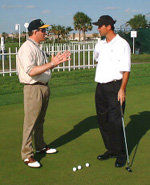
Managing Negative Emotion and Distractions
How often do you become aggravated, agitated, and frustrated during a competitive round of golf?
If you answered a lot, you are not alone. Negative emotions will follow when a golfer slices a tee shot, flubs a chip shot, lands in a sand trap, or misses a three-foot putt.
How you process these emotions makes all the difference. In our Golf Mental Game Survey, we received the following question:
“How can I regain confidence after missing shots during the first three holes?”
How you respond to bad shots determines how your confidence will be affected.
For example, you have a two-foot putt for birdie. You feel confident you can sink the putt with ease. You have sunk similar putts hundreds of times.
You go through your pre-shot routine, but you pull the putt. You get so angry with yourself, “How could I possibly have missed that putt? It was so easy. What if I miss my next attempt and bogey this hole?”
The avalanche of negative thoughts and emotions takes hold of your mind, and you start doubting every shot. Of course, missing the putt was upsetting. However, it was your response or inability to process your emotions quickly that hurt your confidence.
Negative Emotional Mindset
When you feel you need to hit the perfect shots on the first couple of holes to set the tone for the round, you will have difficulty relaxing, focusing, and swinging the club smoothly and freely.
Couple that thought process with the memories of past mistakes can ratchet up the anxiety further. Under those circumstances, missing just one shot is enough to flare up negative emotions and knock you off your game.
Changing your mindset will be the key to keeping your emotions in check and turning your game around.
Instead of believing you should hit every shot just right early in the round, shift to a process-oriented mindset.
A process-oriented mindset sees golf as a work in progress. You are never quite “there.” However, that is a good thing.
When you understand that golf is a work in progress, you will take the pressure off yourself. You will realize that the goal is improvement, exploration, and challenging yourself to be better and better. Though double-hitting will still be a bit upsetting, it will no longer be devastating.
Danielle Kang scored five birdies in a seven-hole stretch to post a 4-under 68 and win the 2022 Grand Vacations Tournament of Champions by three strokes.
Despite being winless in 2021, Kang has kept a process-oriented focus throughout the year, which has helped her remain calm and poised through the tournament.
KANG: “My mental game was really good. I had a really good attitude all day today and yesterday. I know I left some putts out there, but I never let it get to me, and I kept having to give myself birdie chances as much as possible.”Kang had a “never let bad shots get to me” mindset. When you have this present-oriented mindset, one shot is merely one shot. You have another shot, hole, round, or tournament around the corner.
Managing Negative Emotions
Keeping emotions in check requires a process-oriented mindset. Dwelling on bad shot will only keep you entrenched in negative emotions. Ultimately, you have to move on without a “monkey on your back.”
Remind yourself that only the next shot matters. And then focus on your preparation for the next shot.
Related Golf Psychology Articles
- How to Manage Negative Thoughts
- Tips to Manage Emotions on the Golf Course
- Rule Over Your Emotions on The Golf Course
- Subscribe to The Golf Psychology Podcast on iTunes
- Subscribe to The Golf Psychology Podcast on Spotify
Golf Mental Coaching Programs

All golf psychology programs include the Golfer’s Mental Aptitude Assessment (GMAP), a custom Mental Game Plan, weekly coaching sessions, unlimited email correspondence, and The Golfer’s Mental Edge 2.0 workbook program.
One-on-one mental coaching is the fastest and most effective method to improve your mental game, boost your performance, and make lasting changes!
We have unique mental coaching programs, customized for you. Please contact us with any questions your have about our programs. Provide your name, email, and role below:
Or Call us today at 888-742-7225 | Mental Game Success Stories